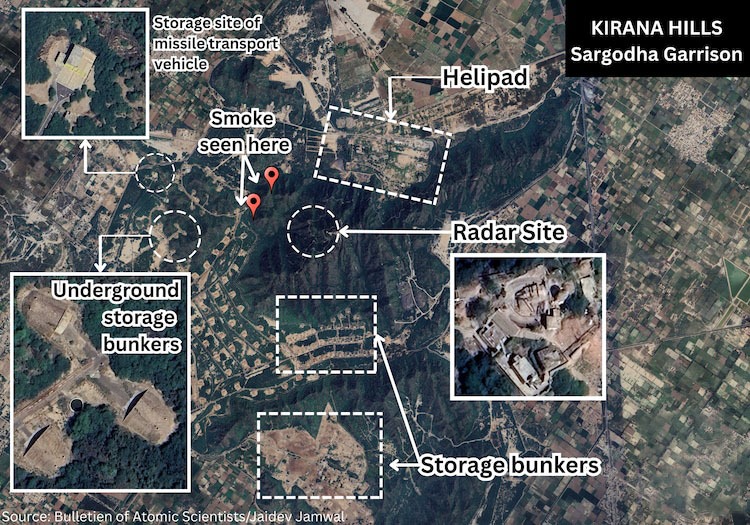Recent military actions have intensified concerns over Pakistan’s nuclear security, particularly regarding an area known as the Kirana Hills site in Punjab, Pakistan. While India has denied targeting this area, the presence of underground nuclear infrastructure raises questions about potential radioactive hazards, as well as the post-attack international response is surely one to watch out for.
The Kirana Hills, located in Pakistan, are home to their underground nuclear infrastructure. These facilities are designed to withstand significant blasts, indicating their role in Pakistan’s nuclear deterrent strategy. The site has been associated with subcritical tests, which are experiments conducted to study nuclear materials without achieving a full-scale nuclear reaction.
However, since India targeted the sites, rumours swirl of a devastating impact in the region. After India bombarded multiple sites with precision strikes, one of which was the Kirana hills, the United States suddenly became involved in the conflict. US Vice President JD Vance called the Indian authorities with some alarming information. It has not yet been revealed what the details discussed were. Soon after, the US President Donald Trump waded in and declared that he had managed to find some kind of agreement between the two sides.
What proceeded was even more bizarre. India denied that it had committed to any ceasefire but stated that it had agreed. The clashes stopped. Trump then claimed that he had helped stop a nuclear clash and saved millions of lives.
Rumours of a Coverup
Later, social media sites swirled with rumours of a US Nuclear specialist team heading to Pakistan, while some speculated that urgently arriving Egyptian airlines were carrying Boron, a material used to control nuclear fallout, and which is available in Egypt along the Nile.
Boron plays a crucial role in nuclear reactors as a neutron absorber, used in control rods and emergency shutdown systems to regulate the chain reaction and prevent uncontrolled fission.
An Egyptian Air Force transport aircraft leaving a small airport in the Pakistan hill district of Muree has set off a wave of speculation about the purpose of the flight at the time of heightened tensions with India.
The Egyptian Air Force transport aircraft, call sign EGY1916, left the Bhurban airport (BHC) on May 11 afternoon, Flightradar24 data shows, a day after the two countries agreed to stop all military action.
The aircraft arrived in Pakistan from China, but its next destination was unclear. The arrival of the aircraft comes amid claims of India hitting some airport strips believed to be close to where Pakistan stores its nuclear arsenal.
Also read: Did Pakistan lose control of its nuclear installations? US intervenes after India devastates airbases
Attack on Pakistan
Following India’s missile strikes on Pakistani airbases, including on the strategically significant Nur Khan Airbase near Islamabad, questions are swirling about whether the attacks affected sensitive nuclear facilities.
Pakistan’s military has confirmed that three of its air force bases were struck by Indian missiles, including the Nur Khan Airbase in Rawalpindi, Pakistan’s military headquarters. The Nur Khan base is also vital to Pakistan’s nuclear command infrastructure.
A New York Times report of May 11 said, a former American official long familiar with Pakistan’s nuclear programme noted that Pakistan’s deepest fear is of its nuclear command authority being decapitated.
The missile strike on Nur Khan could have been interpreted, the former official said, as a warning that India could do just that, the report, which examined the reasons for the US brokering a “ceasefire”.
It is unclear whether there was American intelligence pointing to a rapid, and perhaps nuclear, escalation of the conflict. At least in public, the only piece of obvious nuclear signaling came from Pakistan. Local media reported that Prime Minister Shehbaz Sharif had summoned a meeting of the National Command Authority — the small group that makes decisions about how and when to make use of nuclear weapons, the report said.
Now neither India nor Pakistan or the US have confirmed this incident but there are enough indications to suspect that something is largely amiss. If something like this has happened, then it can only be kept quiet for a certain while after which the true details will come out and reveal what really happened at Kirana hills.








